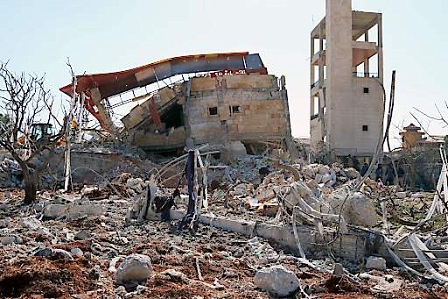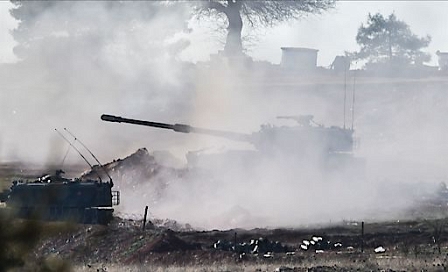Erstellt am: 15. 2. 2016 - 15:46 Uhr
Too good to be true
Three days ago, optimists saw a glimmer of hope emerging from the Munich conference on Syria.
FM4 Reality Check
Hear the programme in the FM4 Player or subscribe to the podcast and get the whole programme after the show
While not quite a ceasefire, major powers managed to come up with something called a "cessation of hostilities", which would come into effect later this week. Just how that was to be achieved, however, wasn't clear, especially as none of the warring factions were party to the agreement.
Today, the bombing of two hospitals in Syria and no indications at all of a decrease violence, suggest that whatever the major powers may have signed up to, that agreement is having little effect on the ground.

AFP/Stringer
In a war in which there are so many sides, with so many competing and incompatible interests, it's hard to see how it could.
In today's Reality Check, international security analyst, Paul Rogers, addressed the question of whether the parties to the Munich agreement have either the will or the way to implement their pledges:
There seems to be very little evidence of that, and it's rather complicated by the fact that the regular Geneva talks between the broad base, the various opposition groups, and the Syrian government, which were into their phase last week, do not seem to have got anywhere either. As the UN representative was saying, as soon as they seem to get near the talks, one side or the other seems to increase the level of fighting. It's almost as though the different sides are competing to be at as big an advantage as possible before any sort of serious negotiations happen, and I think that's the background to this overall. The sort answer is, that although people were slightly hopeful last week, I think that has deteriorated now, further complicated by the Russian, and indeed the Turkish, actions over the last 24 hours.
Let's talk about the Russians. Has Russia continued its bombardment, stepped up things or cooled off its attacks since Friday?
It seems to be being maintained. Over the weekend there were reports of around 100 air strikes by Russian and also Syrian forces. These were largely against the rebels who represent the biggest threat to the Syrian government, so they do not really include much in the way of actions against ISIS, which tends to be almost on one side in this. ISIS is concerned with its own territory, resisting American and coalition air strikes rather than taking on the Assad regime. Indeed there even seem to be some economic links: there have long been reports of oil going from the area controlled by ISIS through towards the Assad regime. So, really what the Russians are doing is strengthening the regime, and that seems to be their main point. There isn't very much sign that they are actually desisting from that at the moment, I'm afraid.
You mentioned Turkey, and we've had some worrying things happen here, as well. The French foreign ministry has, in fact, called on Turkey to halt shelling of the Kurdish regions in northern Syria - Kurdish groups were hitting ISIS targets there - so Turkey seems to be not stepping back, but stepping up its action.
Yes, in the last few hours Turkey has denied that its troops have gone over the border into the Kurdish part of Syria, vut there has certainly been an increase in the violence there. The background to this is that relations between the Turks and the Kurds in Iraq are passable. They are not good, but they are not at a high state of tension. The Turks have long regarded the Kurds in Syria as being more radical and more directly opposed to the Turkish government, and so they do not want to see the Kurdish part of Syria come under more firm Kurdish control in whatever settlement comes out.

AFP/Bulent Kilic
But Turkey seems to be under pressure from other states, now as we know from France, not to increase the level of attack on the Kurds, and that may have some effect. It's a further complication. I mean, if you look a year or so ago, it was always a double conflict, because you had, at different levels, both the regional powers and the super powers involved. It's further complicated by the Russian involvement over the last four or five months, and also the position of Turkey, which is very complex - it's looking at it in multiple ways at the same time. This is what makes is so difficult to see any prospect of the whole conflict coming to an earlier end.
Part of what was agreed on Friday was a task force chaired by Russia and the US to work to implement the truce. Are we starting to see any of that coming together between these two powers?
We see very little of it. I mean the only saving grace in all of
this, and it's not a big one, is that Sergei Lavrov and John Kerry, the key negotiators, have a reasonably good personal working relationship. If that wasn't the case it would be even worse, but Lavrov is the servant of his government, as indeed Kerry is of his, and it's what the governments are saying, leaving these senior negotiators to work from, which makes it so difficult. No, the reality is, that good words were seen to be coming out at the end of last week, but 72 hours later it does not look at all hopeful, and that is, frankly, the position at present.
Dieses Element ist nicht mehr verfügbar
FM4 Reality Check
Monday to Friday from 12.00 to 14.00, Saturday from 12.00 to 13.00, and after the show via Podcast or fm4.orf.at/realitycheck.


